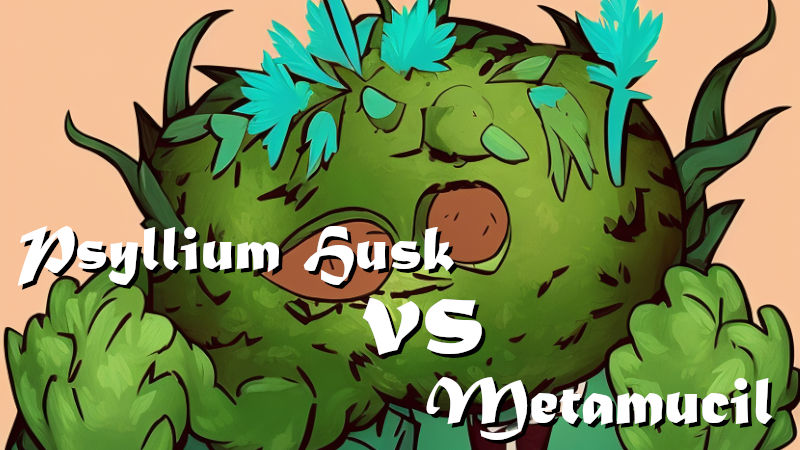If you are looking for a fiber supplement, you may have come across two popular options. In this article, we consider them as we stack up psyllium husk vs Metamucil.
Both products are designed to help with constipation, bloating, and other digestive issues. However, they are not identical. Let’s take a few minutes to explore the main differences between them, and consider why some people prefer one over the other.
Table of Contents
Psyllium Husk vs Metamucil: The Main Differences
Psyllium husk is a natural fiber supplement derived from the seeds of the Plantago ovata plant. It contains high levels of soluble fiber, which can absorb water and create a gel-like substance in the gut. 1 2

This gel can help soften stools, reduce constipation, and regulate bowel movements. Psyllium Husk is usually sold as a powder or in capsules and can be added to food or drinks. 3
Metamucil, on the other hand, is a brand name for a fiber supplement currently made by Procter & Gamble. It contains psyllium husk as its main ingredient, as well as other ingredients such as sugar, artificial colours, and flavours. I’m pretty sure you can guess my stance on that.
Metamucil not only comes in different flavours but it can also be bought in powder or capsule form, as well as gummies and biscuits.
Why Psyllium Husk is Preferred by Some
Psyllium husk is often preferred by people who are looking for a natural and minimally processed fiber supplement. As a completely natural product, it contains no additives and is free from sugar, gluten, and other common allergens.
When considering psyllium husk vs Metamucil, psyllium is also considered to be gentler on the stomach than Metamucil. This is attributed to it not containing artificial ingredients.
Some people also find that psyllium husk is more effective at relieving constipation and promoting regulating bowel movements.
Why Metamucil is Preferred by Others
Metamucil is a popular choice for people who are looking for a convenient and tasty fiber supplement. It comes in a variety of flavors, such as orange, berry, and unflavoured, and can be easily mixed with water or other beverages.
Metamucil also contains additional ingredients that may be beneficial for digestive health, such as calcium, collagen, magnesium, and potassium to name a few. Some people find that Metamucil is more effective at reducing bloating and gas than psyllium husk.
Things to Consider for Yourself
When figuring out who is going to win the battle in the psyllium husk vs Metamucil showdown, there are a few things for you to consider:
- Ingredients
- If you are looking for a natural and minimally processed supplement, psyllium husk may be a better option for you. If you prefer a more convenient and flavoured supplement, Metamucil may be a better fit.
- Allergies and intolerances
- If you have allergies or intolerances to certain ingredients, make sure to check the label carefully before purchasing. Remember, you can always scan the barcode with the Yuka app to see what the deal is with the ingredients and their safety considerations.
- Taste
- Some people find the taste and texture of psyllium husk to be unpleasant, while others enjoy it. The same goes for Metamucil – some people love the taste, while others find it too sweet or just plain artificial.
- Effectiveness
- Both psyllium husk and Metamucil can be effective at relieving constipation and other digestive issues, but individual results may vary. You may need to try both products to see which one works best for you.
FAQs
Is taking Psyllium Husk the same as taking Metamucil?
No, to clarify the differences in the psyllium husk vs Metamucil debate, taking psyllium husk is not the same as taking Metamucil. Metamucil is a brand name for a fiber supplement that contains psyllium husk as its main ingredient, as well as other ingredients such as sugar, artificial colours, and flavours.
Can I use Metamucil instead of Psyllium Husk powder?
Yes, considering the psyllium husk vs Metamucil topic, you can use Metamucil instead of psyllium in powder form. Metamucil contains psyllium husk as its main ingredient but also contains other ingredients such as sugar, artificial colours, and flavours.
What works better than Metamucil?
There are many other fiber supplements available that may work better than Metamucil for certain individuals. Some examples include the husk as a powder, inulin powder, and chia seeds. It is best to speak with a healthcare professional to determine which fiber supplement may work best for you.
When should you not take Metamucil?
Metamucil should not be taken if you are experiencing abdominal pain, nausea, or vomiting. It is also important to speak with a healthcare professional before taking Metamucil if you have a history of gastrointestinal blockage or if you are taking any medications as there may be conflicts.
What are the disadvantages of Metamucil?
Some of the disadvantages of Metamucil may include its potential to cause bloating, gas, and stomach discomfort in some individuals. It may also contain artificial ingredients that some people may wish to avoid.
How long can you safely take Metamucil?
Metamucil can be taken safely for long-term use, as long as it is used as directed and under the supervision of a suitably qualified healthcare professional you trust.
What happens if you don’t drink enough water with Metamucil?
If you don’t drink enough water with Metamucil, it may cause constipation or even blockages in the digestive tract. It is important to drink plenty of water when taking Metamucil to prevent these potential side effects.
Is Metamucil good for IBS?
Metamucil may be beneficial for individuals with irritable bowel syndrome (IBS) as it can help regulate bowel movements and reduce constipation. However, again, it is important to speak with a healthcare professional before taking Metamucil if you have IBS or any other digestive conditions.
Is Metamucil best on an empty stomach?
Metamucil can be taken on an empty stomach or with food. It is important to follow the instructions on the product label and to drink plenty of water when taking Metamucil.
How long after taking Metamucil do you poop?
The time it takes to have a bowel movement after taking Metamucil can vary depending on individual factors such as diet, hydration levels, your general transit time, and digestive health. Some people may have a bowel movement within a few hours of taking Metamucil, while others may take longer.
Is Metamucil bad for the liver or kidneys?
Metamucil is generally considered safe for individuals with liver or kidney disease. However, it is important to speak with a healthcare professional before taking Metamucil if you have any underlying medical conditions to be sure there aren’t any conflicts.
What happens to your body when you start taking Metamucil?
When you start taking Metamucil, it can help regulate bowel movements and reduce constipation. The psyllium husk in it can also help lower cholesterol levels and improve blood sugar control. Some people may experience bloating or gas when starting Metamucil, but these side effects usually subside over time.
What does Metamucil do to your intestines?
Metamucil works by adding bulk to stool and helping it move more easily through the intestines.
The soluble fiber in Metamucil can also absorb water and create a gel-like substance in the gut, which can help soften stools and reduce constipation.
Additionally, the insoluble fiber from the psyllium husk in Metamucil, like Sea Moss, can act as a prebiotic, providing food for the good bacteria in the gut and promoting overall digestive health.
Conclusion
Both psyllium husk and Metamucil can be effective options for managing digestive health. While psyllium husk may be preferred by some for its natural qualities and more affordable price point, Metamucil is favoured by others primarily for its convenience and variety of flavours.
Ultimately, the choice between psyllium husk vs Metamucil comes down to your individual preferences and values. Regardless of which product you choose, it is essential to prioritise your digestive health and consult with a healthcare professional before starting any new supplement regimen.
Depending on if you suffer from conditions like leaky gut, it is worthwhile discussing either course of action with your trusted Dietitian or Doctor first.
Aside from finding out how to take psyllium husk, considering the potential for psyllium husk side effects, even though it is a natural alternative to Metamucil, is worth evaluating. Given that the Metamucil ingredients are a detractor for many, there may be a suitable weighting to psyllium.
Which would you choose out of the psyllium husk vs Metamucil options? Join the conversation on Instagram or Pinterest.
References
- “Plantago ovata – Forssk” – PFAF Staff, Last Checked 17 March 2023 [Plants for a Future] [Archive] ↩︎
- “Effects of soluble fiber (Plantago ovata husk) on plasma lipids, lipoproteins, and apolipoproteins in men with ischemic heart disease” – R. Solà, G. Godàs, J. Ribalta, J. C. Vallvé, J. Girona, A. Anguera, M. Ostos, D. Recalde, J. Salazar, M. Caslake, F. Martín-Luján, J. Salas-Salvadó, L. Masana, April 2007 [PubMed] [Archive] ↩︎
- “Psyllium is superior to docusate sodium for treatment of chronic constipation” – J. W. McRorie, B. P. Daggy, J. G. Morel, P. S. Diersing, P. B. Miner, M. Robinson, May 1998 [PubMed] [Archive] ↩︎
Last Updated on 6 months by D&C Editorial Team


